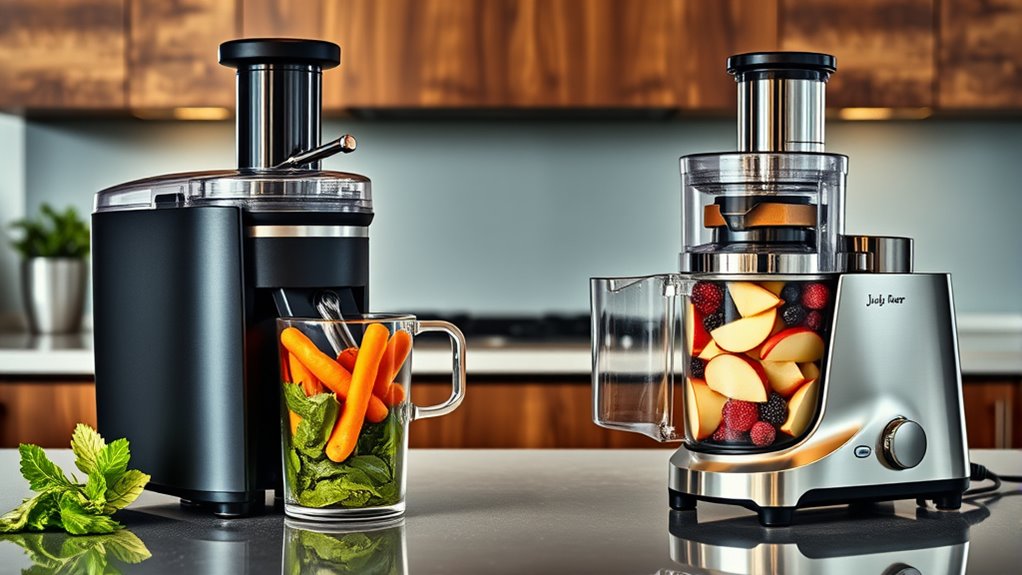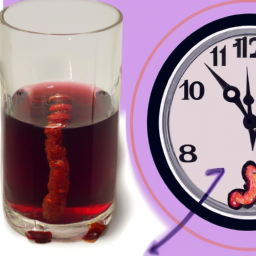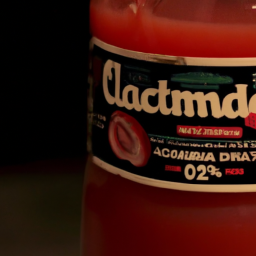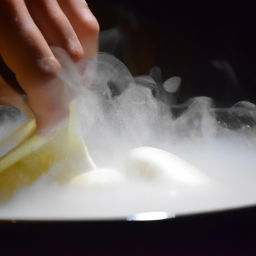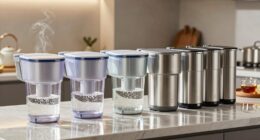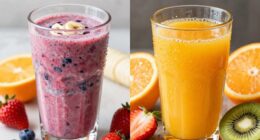Cold-pressed juicers use slow crushing and pressing to extract juice, which helps preserve more nutrients, fiber, and enzymes, while operating quietly. Centrifugal juicers spin produce at high speeds, offering quick juice extraction but with more heat and oxidation that reduce nutrition and shelf life. If you prioritize nutrient-rich, long-lasting juices and don’t mind more prep, cold-pressed is ideal. For faster everyday use, centrifugal might suit you better—learn more below.
Key Takeaways
- Cold-pressed juicers use slow crushing to preserve nutrients, while centrifugal juicers spin at high speeds for quick extraction.
- Cold-pressed juices retain more nutrients, antioxidants, and fiber compared to the nutrient loss in centrifugal juices.
- Centrifugal models are faster and more affordable but generate more heat and oxidation, reducing juice quality.
- Cold-pressed juicers are quieter, require more prep, and are ideal for nutrient-focused, long-term juice storage.
- Centrifugal juicers suit busy lifestyles with quick operation and lower upfront costs, but offer lower nutritional benefits.
How Each Juicer Extracts Juice
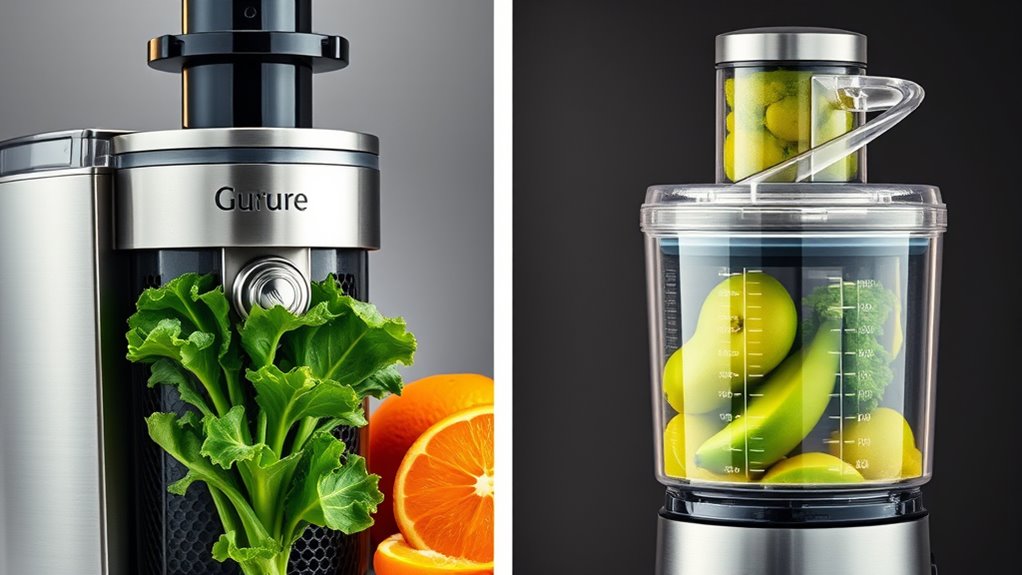
While both cold-pressed and centrifugal juicers extract juice from fruits and vegetables, they do so through different mechanisms. Cold-pressed juicers use slow, gentle crushing and pressing to extract juice, which minimizes heat and oxidation. This method works well for both fruit and vegetable juices, preserving nutrients better. Nutrient retention is a key advantage of cold-pressed juicing, as the gentle process helps maintain the integrity of delicate vitamins and enzymes. Additionally, the slow extraction process reduces heat buildup, further helping to preserve nutrients. This gentle method is especially effective at retaining enzymes and antioxidants that can be damaged by heat. Research shows that the reduced oxidation in cold-pressed juicing extends the shelf life of the juice and maintains its fresh flavor. Centrifugal juicers, on the other hand, rely on high-speed spinning blades that shred produce and spin the juice out through a mesh filter. This process is quick but generates more heat and oxidation, which can affect juice quality. When it comes to noise levels, centrifugal juicers tend to be louder because of their fast motors and blades. Cold-pressed juicers operate more quietly, making them preferable if noise is a concern during juicing. Additionally, the extraction method impacts the overall nutrient retention and shelf life of the juice.
Differences in Juice Quality and Nutrition
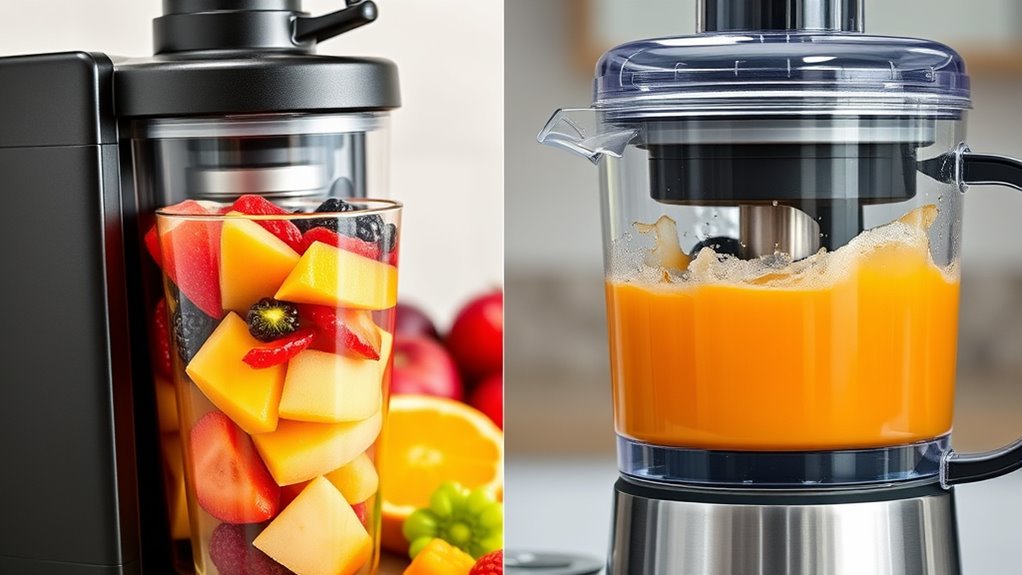
The way each juicer extracts juice substantially impacts its quality and nutritional value. Cold-pressed juicers typically preserve more nutrients because they operate slowly, minimizing heat and reducing oxidation levels. This process helps retain fiber and antioxidants, resulting in juice that’s richer in vitamins and minerals. Oxidation levels can influence the shelf life and nutrient retention of the juice, making cold-pressed methods preferable for maximum nutrition. Additionally, cold-pressed juicers often retain more nutrients due to their gentle extraction process, which minimizes nutrient degradation. Centrifugal juicers extract juice quickly using high-speed spinning, which can introduce more oxidation, breaking down delicate nutrients and reducing fiber retention. As a result, the juice may have a shorter shelf life and slightly lower nutritional quality. If you prioritize maximum nutrition and fiber, a cold-pressed juicer offers superior juice quality. However, if convenience and quick results matter more, centrifugal juicers still produce decent juice, albeit with some nutrient loss.
Speed, Convenience, and Ease of Use
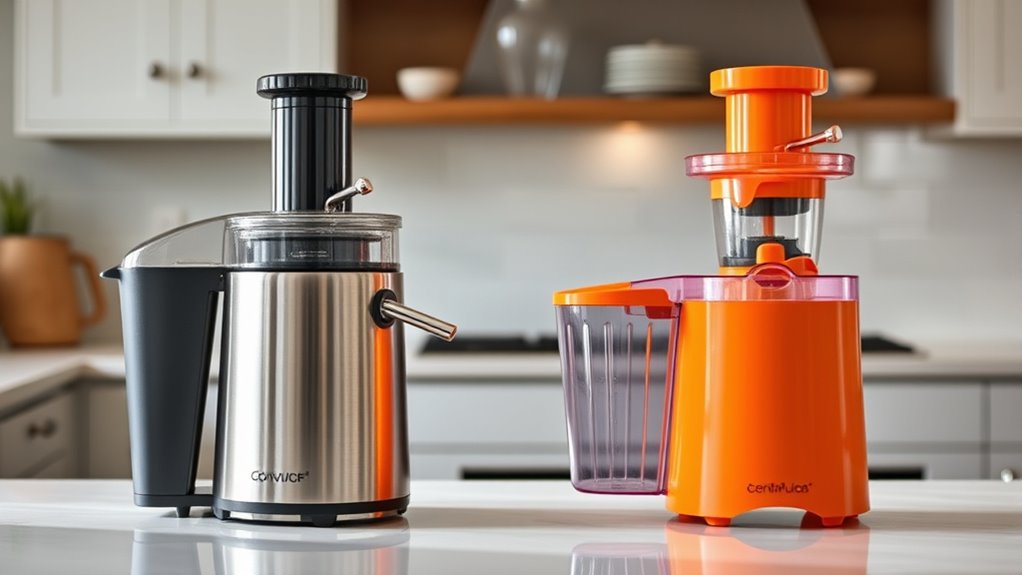
When it comes to speed and convenience, centrifugal juicers have a clear edge because they can produce juice in a matter of seconds. You’ll appreciate how quickly you can get fresh juice, making them ideal for busy mornings. However, their juice shelf life tends to be shorter, so you’ll want to drink it promptly to enjoy maximum nutrients. Centrifugal juicers are also noisier, which might be disruptive if you’re early in the morning or in a shared space. Cold-pressed juicers, on the other hand, require more prep and longer processing times, but they offer benefits like less noise and potentially longer juice shelf life. Overall, centrifugal models are more straightforward for quick, daily use, while cold-pressed juicers excel in producing high-quality juice with less fuss over time. Additionally, some personal finance management strategies, like automating savings, can help you afford higher-quality appliances like cold-pressed juicers. Modern juicing technology advancements can also improve the efficiency and quality of cold-pressed machines, making them more accessible and worthwhile investments.
Cost and Maintenance Considerations
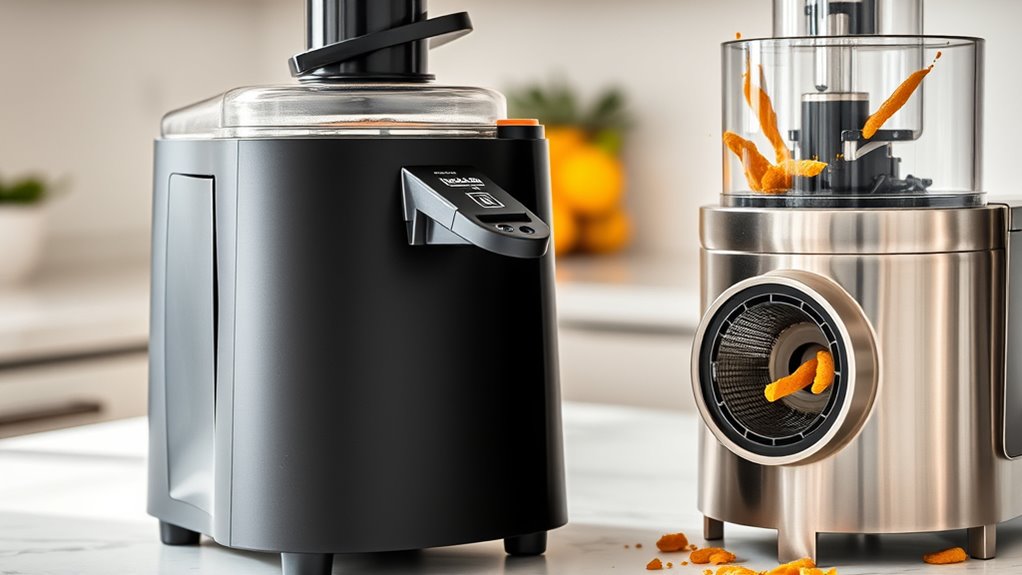
Centrifugal juicers typically come with a lower upfront cost and are more affordable to operate than cold-pressed models. Their pricing strategies often focus on budget-conscious consumers, making them accessible for daily use. Maintenance tends to be straightforward, with fewer parts that need regular cleaning, but you should expect some wear and tear over time. Warranty coverage varies by brand; most offer limited warranties that cover motor issues but might exclude parts like filters or blades. Cold-pressed juicers usually cost more initially and may have higher long-term maintenance costs due to their complex mechanisms. However, their durability and extended warranty coverage can offset these expenses. When choosing, consider your budget and how much you’re willing to invest in ongoing upkeep. Additionally, understanding the types of juicers and their specific maintenance needs can help you make a more informed decision. For example, electric dirt bikes, such as those from KTM, emphasize cost and maintenance considerations, which can be applicable when evaluating different types of appliances or equipment. Sometimes, selecting a juicer that aligns with your lifestyle and long-term durability can save money and hassle over time. Incorporating proper cleaning routines and paying attention to wear and tear can also extend the lifespan of your juicer and ensure optimal performance.
Ideal Users and Best Uses
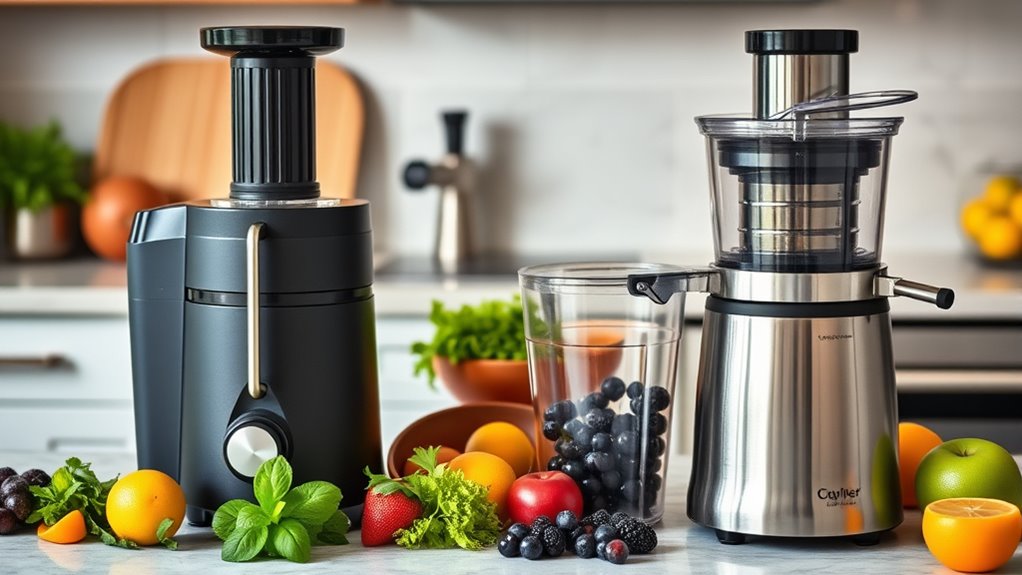
Cold-pressed juicers are ideal for health-conscious individuals who prioritize nutrient retention and quality over speed. If you’re serious about maximizing juice freshness, you’ll appreciate their longer juice storage capabilities with minimal oxidation. These juicers are perfect for those who prefer making juice in advance or enjoy experimenting with different ingredients. Keep in mind, their cleaning methods require more time due to multiple parts, but this effort pays off with cleaner, purer juice. If you value nutrient preservation and don’t mind a slower process, a cold-pressed juicer suits your needs. It’s especially beneficial when you want to store juice for later without losing essential vitamins. Overall, these juicers are best for dedicated juicers who prioritize quality over convenience and are willing to invest in proper juice storage and cleaning routines. Durability and safety features are also important considerations when choosing a model. Additionally, understanding the role of attention in maintaining consistent quality can help users develop better cleaning and operation habits, ensuring optimal performance over time.
Frequently Asked Questions
How Long Do Cold-Pressed and Centrifugal Juices Typically Last?
You might wonder about juice shelf life and preservation tips. Typically, cold-pressed juices last up to 72 hours in the fridge, retaining nutrients longer due to minimal oxidation. Centrifugal juices, however, usually stay fresh for about 24 hours because they’re exposed to more air during processing. To extend freshness, store juices in airtight containers, keep them cold, and consume promptly to enjoy maximum flavor and nutrients.
Are There Specific Fruits or Vegetables Better Suited for One Type of Juicer?
Imagine a world where your juicing game reaches legendary status! For the best results, you should consider fruit pairings and vegetable textures. Cold-pressed juicers excel with leafy greens, soft berries, and delicate fruits, preserving nutrients. Centrifugal juicers handle firmer produce like apples, carrots, and beets with ease, thanks to their powerful spinning blades. Choose wisely to maximize flavor, nutrients, and juice yield—your taste buds will thank you!
Can Both Juicer Types Handle Leafy Greens Effectively?
You might wonder if both juicer types handle leafy greens effectively. Cold-pressed juicers excel at extracting nutrients from leafy greens, producing juice with high clarity and minimal oxidation. Centrifugal juicers can process leafy greens too, but the juice may be less clear and slightly frothy. For the best juice clarity and nutrient retention, cold-pressed juicers are a better choice for leafy greens, especially if you prioritize quality.
Which Juicer Type Produces Less Foam and Pulp?
Imagine squeezing a sponge gently versus ripping through it—cold-pressed juicers are like the gentle squeeze, producing less foam and pulp. They excel at foam reduction and yield a smoother juice with minimal pulp. Centrifugal juicers, akin to tearing the sponge, often create more foam and pulp. So, if you prefer a cleaner, less frothy juice, a cold-pressed juicer is your best bet for less foam and pulp.
How Noisy Are Cold-Pressed Versus Centrifugal Juicers During Operation?
You’ll notice that cold-pressed juicers operate much quieter than centrifugal ones. Their noise levels are minimal, producing gentle operational sounds that won’t disturb your kitchen. In contrast, centrifugal juicers generate louder sounds due to high-speed spinning, which creates more noise during operation. If you prefer a peaceful environment while juicing, a cold-pressed juicer is the better choice for keeping noise levels low.
Conclusion
Choosing between cold-pressed and centrifugal juicers depends on what matters most to you—nutritional value, speed, or budget. While cold-pressed models offer superior juice quality and nutrients, they take longer and cost more upfront. If you’re in a rush or on a tight budget, centrifugal juicers still deliver quick, satisfying results. Ultimately, investing in the right juicer means balancing your priorities—so don’t let initial costs deter you from enjoying fresh, healthy juice every day.
Hi, I’m Alexander. I’m a vegan of over 20 years, and I initially made the switch for health reasons. However, as time went on, I became more and more passionate about the ethical and environmental implications of leading a vegan lifestyle.
I am the author of The Graceful Kitchen, a vegan blog where I share recipes for delicious and nutritious vegan meals. As someone who is deeply committed to living a cruelty-free life, I am also a strong advocate for using whole foods as the foundation of a healthy diet – and believe that going vegan is one of the best ways to achieve this.
